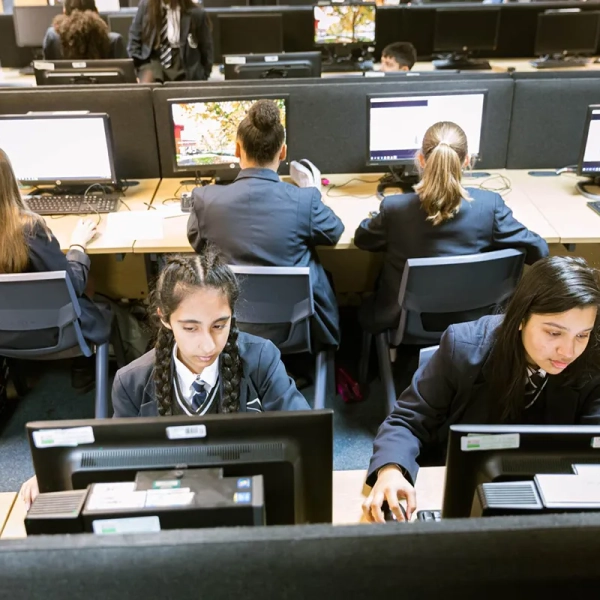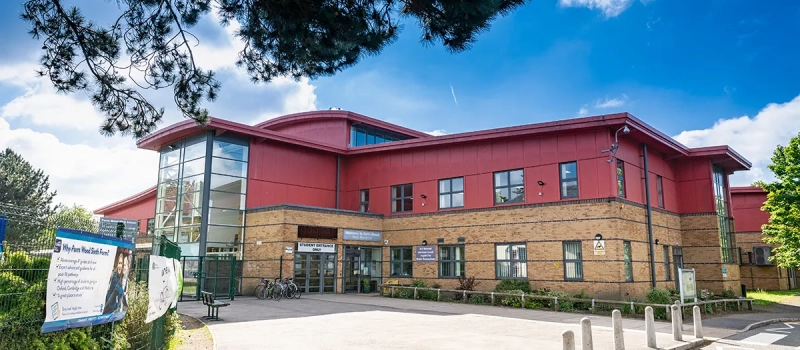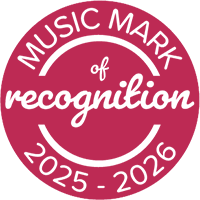Computing
We will equip pupils with the skills and knowledge to stay safe online and treat their peers with respect. Our intention is to provide pupils with a strong knowledge of understanding computers and be able to apply this theory to the real world. Pupils will follow an ambitious and engaging curriculum and by the end of KS3, pupils will have acquired the enthusiasm and skills required to progress onto GCSE Computer Science and BTEC Digital Information Technology.
At the end of Key Stage 4 we expect pupils to develop their skills in programming systems and logical thinking. They will start to understand how computers work and be able to design and create algorithms to solve problems. Pupils will gain a deeper understanding at the importance of technology in today’s society and be able to analyse the impact and issues surrounding computing systems. Pupils will also develop the skills required to work effectively in a digital environment, such as project planning, designing & creating user interfaces and presenting & interpreting data.
In accordance with The National Computing Curriculum (Key Stage 4) those pupils who do not choose to study Computer Science or BTEC DIT at GCSE level are given the opportunity to study aspects of Information Technology and Computer Science at sufficient depth to allow them to progress to higher levels of study or to a professional career.
The National Curriculum states that pupils at Key Stage 4 should be taught to:
- Develop their capability, creativity and knowledge in computer science, digital media and information technology
- Develop and apply their analytic, problem-solving, design, and computational thinking skills
- Understand how changes in technology affect safety, including new ways to protect their online privacy and identity, and how to report a range of concerns
At Parrs Wood, we include a range of opportunities within other subjects which allows pupils to access a relevant use of technologies and digital literacy. In the core subjects of English, Maths, Science and PSHE, pupils will develop their ICT skills to carry out research, analyse data, produce written reports and deliver presentations. They build on their research skills to use methods that search for specific and relevant information. They also make use of graphs and charts to visually illustrate and allow analysis of data; skills that will be important at university, in employment or further training and beyond. In Maths, they are taught how to extend iterations using a calculator and develop their problem solving and decomposition skills. Whilst, in Science they build on their analytical and problem solving skills across all three subject areas of Physics, Chemistry and Biology.
Through PSHE lessons and the Personal Development Curriculum time, pupils explore a range of issues related to the safe use of technology. For example, pupils learn about the dangers of gambling and internet addiction as well as other online dangers. They consider the value of their own personal data and learn when it is appropriate to share information online as well as how to keep themselves secure. There is practical advice and support around the social pressures of using technology and its impact on self-image and mental health.
Pupils will also develop their Information Technology and Computer Science skills in the subjects they have chosen for their options. For example in Business, pupils are taught how to create cash flow forecasts using spreadsheet software and use programmes such as PowerPoint and digital media to create presentations and materials for their business plans. In GCSE Media, pupils develop their design skills using photoshop to create and edit their own magazine covers as part of their coursework. In Performing Arts, GCSE classes have created pieces that explore digital media and grooming, online abuse and online addiction.
Most subjects make use of Computing to support the setting of homework, exam preparation and revision, thus helping to develop skills required for both GCSE and beyond.
Key Stage 3
Year 7:
- Working Electronically
- E-safety – staying safe online
- Scratch (Programming)
- Understanding Computer hardware
- History of Gaming and Design
Year 8:
- Computational Thinking
- Control Systems
- Introduction to Python
- E-safety – interpreting information
- Spreadsheets and Logic
- Ethical and environmental issues
- Networks
- HTML
Year 9:
- Esafety – online gambling
- User Interface design
- Advanced Python
- Data representation
- Data modelling
- App development
- Cyber Security
- Web Design
Key Stage 4
We offer the following subjects at Key Stage 4:
-
J277/01: Computer systems:
- 1.1 Systems architecture
- 1.2 Memory and storage
- 1.3 Computer networks, connections and protocols
- 1.4 Network security
- 1.5 Systems software
- 1.6 Ethical, legal, cultural and environmental impacts of digital technology
-
J277/02: Computational thinking, algorithms and programming:
- 2.1 Algorithms
- 2.2 Programming fundamentals
- 2.3 Producing robust programs
- 2.4 Boolean logic
- 2.5 Programming languages and Integrated Development Environments
BTEC Digital Information Technology
- Component 1: Exploring User Interface Design Principles and Project Planning Techniques
- Component 2: Collecting, Presenting and Interpreting Data
- Component 3: Effective Digital Working Practices
Key Stage 5
We offer the following subjects at Parrs Wood Sixth Form (click on the name for a subject leaflet):
- BTEC Computing Level 3
- Computer Science A Level
- BTEC ESports
Contact
Director of Faculty: G. Leak (g.leak@pwhs.co.uk)
















